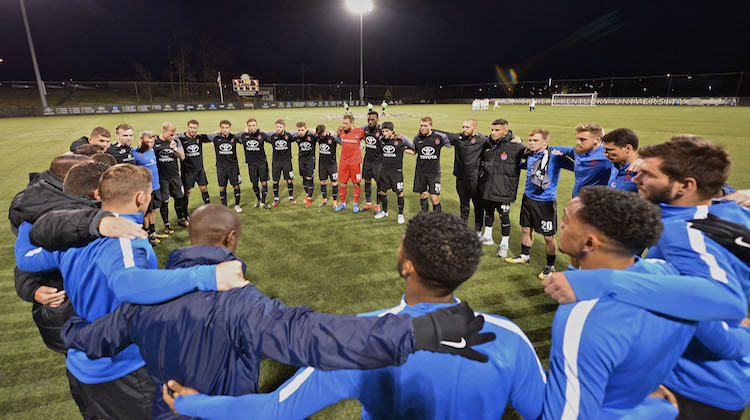When Alan Koch arrived at FC Cincinnati, he was surprised the club wasn’t tracking the physical performance of its athletes. Now that the club has started a program, it’s giving the technical staff a plethora of data.
For every practice and match this season, FCC players are wearing a fitness monitor that gives the club data on their condition — a standard procedure for top-flight soccer clubs. FCC began using the trackers in the preseason.
“If you watch any other team training, all the teams use them,” said strength and conditioning coach Austin Berry. “We wanted to make sure we had as much of a competitive edge as we do for everybody — especially where we hope this club is going. We wanted to get used to the system and using the system and the data as early as we can.”
FCC hired Koch in December 2016 as an assistant coach and director of scouting and analytics. With some shuffling in the technical staff since — Koch became head coach in February 2017 and Berry retired from the pitch to join the staff just a few months ago — adding the devices became a priority.
“When I got here, I was a little surprised we didn’t have them at that stage,” Koch said. “But we’re a new club. You don’t have everything when you start. We discussed with (president and general manager) Jeff (Berding) and the club the importance of it, and Jeff and management were fully supportive of it, which was great. Now it gives us additional data to assess how the players are doing on a daily basis.”
The devices — equipped with GPS and a heart monitor — give the technical staff data on each player. This allows the coaches to gauge how much to push each player on a daily basis before workouts and the results of that effort afterward.
It’s Berry’s job to sift through the data, which he does through STATSports, a sports analytics company based in Ireland with two offices in the U.S. and one in London. Assistant coach Yoann Damet is in charge of designing customized workout sessions. After each day’s session, Berry can share the data with the technical staff in a matter of minutes.
“There’s a lot of metrics,” Berry said. “The ones that we’re most interest in are total distance, acceleration, high metabolic load distance, high speed running.”
The average FCC player runs between 5-6 miles a match, Berry said. But the idea isn’t to come up with a club average. Instead, it’s more beneficial to tailor workouts and expectations to each player’s situation, including position. A center back will have a different regiment than a winger, Berry said.
All the information complements but doesn’t replace coaching decisions. And just having the system in place is vital. Berry also works with athletic trainer Aaron Powell to address the workloads of players recovering from injury.
“It’s real important,” Berry said. “The one thing we stress though is still coach’s intuition. From an injury prevention and tracking, just to give us a huge data base of where a player’s at, where our style of coaches are at — that’s big time for us to have that kind of data.”
Although FCC has only used the devices for a couple of months, many players have worn similar devices with previous clubs. Defender Matt Bahner wore one with the Jacksonville Armada. Bahner said playing 30-plus games during the course of a season makes the data invaluable.
“I actually enjoy wearing them, because you can see if this day was a little lighter or that day was a little harder,” Bahner said. “You can use that data and adjust throughout the week personally, and the coaching staff can use that information to adjust. Having that knowledge definitely helps because it allows you to adjust things as needed. At the end of the day, we all want to stay healthy.”
@rspeirce for @CincySoccerTalk













